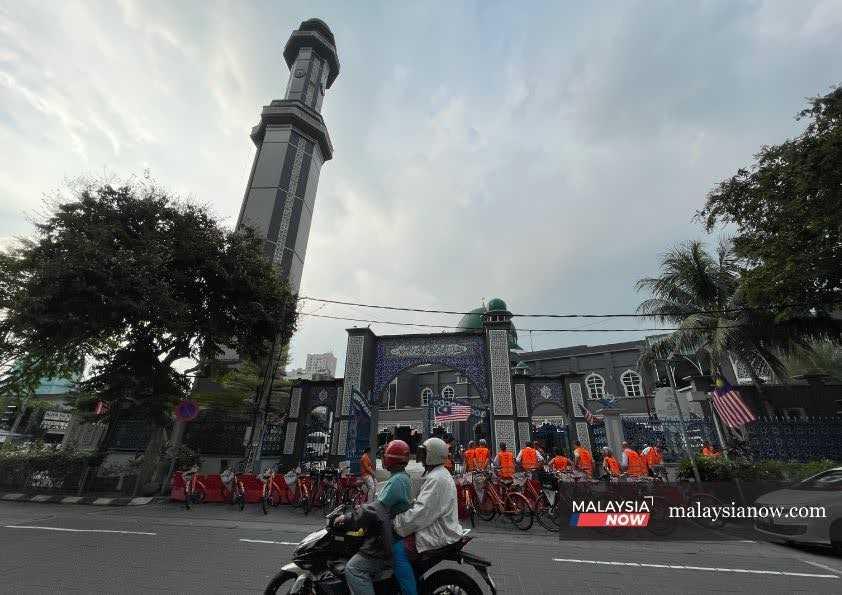In twist of fate, 'reformasi' hotspot Kampung Baru braces for first major anti-govt protest since Anwar's rise
The 'Save Malaysia' gathering has been organised to protest against the decision to discontinue Ahmad Zahid Hamidi's corruption trial.
Just In
Kuala Lumpur's Kampung Baru – a hotspot for "reformasi" protests more than two decades ago – is bracing for its first major anti-government gathering tomorrow since Anwar Ibrahim took office last year, in a twist of political fate for the prime minister whose reforms movement was driven largely by the Malays.
This time, the Malay enclave is set to see tens of thousands chanting slogans against Anwar's coalition government, with a focus on the sudden decision by the government's prosecution team to halt the corruption trial of Deputy Prime Minister Ahmad Zahid Hamidi.
The "Save Malaysia" slogan was the battle cry of Pakatan Harapan (PH) in 2016 when it joined hands with former leader Dr Mahathir Mohamad at the height of the 1MDB scandal, mobilising support that toppled six decades of Barisan Nasional's grip on power two years later.
Organisers have urged those attending the gathering, which coincides with Malaysia Day, to wear white, bring the Jalur Gemilang, and gather at the landmark Kampung Baru mosque, which saw the birth of many political movements in the past.
"This is a gathering of young people. Young people who love the country. No provocation. Follow the law. Respect the police.
"Bribe givers in this country must no longer be tolerated, no matter how high their positions are. Malaysia should be saved from these individuals," said a message on one of Perikatan Nasional's social media pages.
The gathering comes less than two weeks after the High Court was informed of the attorney-general's submission to grant Zahid a discharge not amounting to an acquittal, or DNAA, despite the court saying a prima facie case had been established in the 47 charges against the Umno president.
This followed a series of developments surrounding the trial, including the sudden replacement of a vocal deputy public prosecutor.
Last month, it was announced that Raja Rozela Raja Toran, who had led the prosecution team from the start, had opted for early retirement, raising questions about the future of the trial.
The decision to grant Zahid the DNAA on Sept 4 sparked public outrage, with civil society movements and opposition leaders accusing Anwar of reneging on his promise of reforms.
It also led to the withdrawal of Muar MP Syed Saddiq Syed Abdul Rahman from the government, delivering a blow to plans to pass several constitutional amendments that required a two-thirds majority in the Dewan Rakyat.
Anwar, for his part, has denied interference in the DNAA episode, although he put up a strong defence to justify the decision.
"Was it 47? Every cheque is a charge. So the charge is questionable. Every cheque issued is a charge by itself, which does not necessarily seem to be professionally done," he said when questioned on the matter during a session with the media in Singapore two days ago.
The PH chairman also attempted to portray the 47 charges against Zahid as politically motivated, saying the case was brought up during Mahathir's time and repeating a claim by Zahid that Mahathir had given him an ultimatum to dissolve Umno or face the charges.
Yesterday, police repeated their warnings to organisers that the gathering was unlawful, sparking a strong response from rights groups and lawyers.
In a statement today, Lawyers for Liberty (LFL) hit out at the police's statement rejecting an application to hold the gathering, saying there is no such requirement under the Peaceful Assembly Act 2012, or PAA.
LFL director Zaid Malek also warned authorities against the "harassment" of participants, reminding police that organisers only need to notify them of the assembly.
"Subsequent to the receipt of the notice, the police may then impose restrictions and conditions on the rally, but there is no power for them under the act to outright deny anyone the right to assemble," he said, referring to Article 10(1)(b) of the Federal Constitution.
Subscribe to our newsletter
To be updated with all the latest news and analyses daily.
